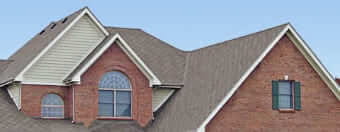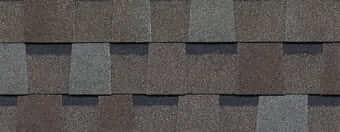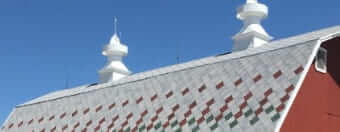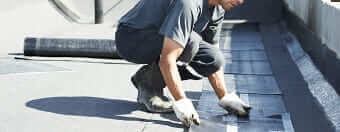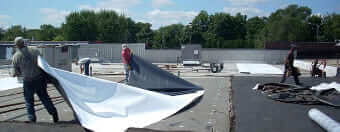from Sherriff Goslin Roofing
Choose your view:
Commercial Roofing Options: Choosing the Best Roof for Your Business
When it’s time to replace or upgrade a commercial roof, the number of choices can feel overwhelming. Flat or sloped? Metal or membrane? What’s best for long-term durability, energy savings, and your building’s design?
The right roofing system protects your investment and cuts down on maintenance, while the wrong one can mean costly repairs. This guide breaks down the most common commercial roofing types and what to consider when choosing the best solution for your property.
What to Consider When Selecting a Commercial Roof
While choosing a roofing system for your business, you will have to evaluate how each system performs over time and how well it matches your building’s requirements.
- Climate & UV Exposure: In hot, sunny areas, reflective materials like TPO can reduce heat gain and lower cooling costs.
- Roof Slope & Drainage: Flat and low-slope roofs often require membrane systems to prevent pooling and leaks.
- Lifespan & Maintenance: Some systems last 20–30 years with minimal upkeep, while others may require more frequent inspections.
- Installation Time & Disruption: If your business needs to stay operational, fast, low-impact installation methods matter.
- Budget Constraints: Upfront costs vs. long-term savings should be weighed carefully—some higher-cost systems pay off with better energy efficiency and longevity.
Before making a final decision, it’s smart to get a professional evaluation of your current system and speak with a roofing contractor familiar with commercial codes and challenges.
Common Commercial Roofing Types & Materials
The best roofing system for your commercial building depends on multiple factors, including local climate, building size, roof slope, insulation needs, and long-term maintenance goals. Some systems excel in heat resistance, while others perform better in wet or cold environments.
Below are five of the most widely used commercial roofing types—and why businesses choose them.
TPO (Thermoplastic Polyolefin)
TPO is a single-ply membrane known for its reflective white surface and UV resistance. It’s often used on flat and low-slope roofs to reduce cooling loads in hot climates. Because it’s heat-welded at the seams, TPO provides strong waterproofing and is less prone to separation or leaks over time.
This system is especially popular in office buildings, shopping centers, and schools due to its cost-effectiveness and energy efficiency. It also resists punctures, mold growth, and dirt buildup, making it a low-maintenance choice for high-traffic rooftops or buildings with HVAC systems on top.
EPDM (Ethylene Propylene Diene Monomer)
EPDM is a synthetic rubber roofing membrane with excellent weathering capabilities. Available in black or white, it performs well in both cold and warm climates and handles temperature fluctuations without cracking or splitting.
Because of its durability and long lifespan, EPDM is commonly installed on warehouses, distribution centers, and industrial buildings. It’s one of the most affordable options for large roof footprints, and repairs can often be done with patches instead of full replacements. Though not as reflective as TPO or PVC, it’s an ideal choice where budget and proven reliability are priorities.
PVC Roofing
PVC is another single-ply membrane, offering greater chemical resistance than TPO or EPDM. It’s often used on buildings that produce oils, grease, or chemical exhausts, such as restaurants, food processors, and manufacturing facilities.
In addition to its toughness, PVC is flame-resistant, puncture-resistant, and easy to install. Its white color also reflects sunlight well, lowering energy costs in hot climates. Over time, it maintains flexibility and weld strength, giving it a longer service life in harsh conditions where other membranes might degrade.
Metal Roofing
Metal roofs are known for their strength, fire resistance, and sleek appearance. They’re typically used on buildings with steep slopes, such as churches, retail stores, and municipal facilities. Materials include galvanized steel, aluminum, copper, and zinc, each with aesthetic and lifespan benefits.
Standing seam metal systems allow for expansion and contraction with temperature changes while maintaining a watertight seal. With proper maintenance, these roofs can last 40+ years and are highly resistant to wind, hail, and debris. Though installation costs are higher, metal roofs offer one of the longest lifespans of any commercial system.
Modified Bitumen & Built-Up Roofing (BUR)
Modified bitumen and BUR systems are multi-layered asphalt-based roofs designed for flat surfaces. They combine layers of bitumen with reinforcements like fiberglass or polyester for added strength and waterproofing. BUR systems often include gravel surfacing for UV protection and weight distribution.
These systems are commonly found on older commercial buildings and remain a solid option for durability, especially in cold or snowy regions like around the Great Lakes. While heavier and more labor-intensive to install, they provide excellent insulation, fire resistance, and impact protection. For building owners who prioritize time-tested performance, these systems still hold their place in the modern market.
Not Sure What Roof Your Business Needs? Talk to the Experts at Sherriff Goslin Roofing
The right commercial roofing system depends on different factors of the materials, including long-term performance, energy efficiency, and how well the system suits your building’s layout and needs. A poorly matched or aging roof can lead to water intrusion, rising utility costs, and ongoing maintenance issues. If you’re weighing options like TPO, EPDM, metal, or built-up roofing, a professional inspection can help you avoid costly missteps.
Sherriff Goslin Roofing provides commercial roof inspections, repairs, and full replacements across Michigan, Indiana, Ohio, and Florida. Our team evaluates existing systems, explains the pros and cons of each roofing material, and delivers tailored solutions that meet code, budget, and performance goals.
Schedule a Commercial Roof Inspection or Get an Estimate Today
Not sure which roofing system is right for your building, or whether it’s time to replace the one you have? Our team can help. Sherriff Goslin Roofing provides detailed inspections to assess system condition, material performance, and long-term risk factors like leaks or energy loss.
We’ll walk you through your options, recommend the most effective solution for your structure, and provide a clear estimate for installation or repair. Financing options are available to keep your project aligned with your timeline and budget. Contact us today to get started.

